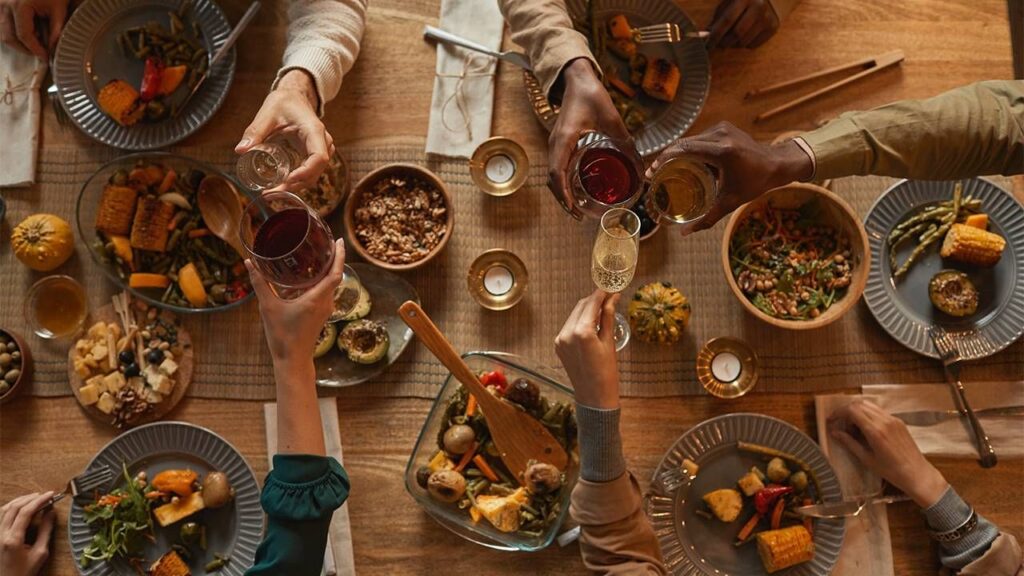TIME NOTICE: This article was written by a student in the Journalism Fundamentals class in the 2024-2025 school year and may not reflect the most current information of the date of publication.
According to a study conducted by OnePoll, 52% of Americans work to replicate holidays from their childhood, as they continue to practice the traditions they had growing up. These practices aren’t just about maintaining routine; they’re about carrying forward the values, stories and identities that define who we are.
For many families, including my own, these traditions often revolve around sentimental recipes passed down through generations. My great-grandmother left behind a handwritten recipe to make bobka, a Polish bread, with ambiguous directions: “two or three eggs… two to three cakes of yeast…” Later generations of my family have tried to make sense of the ambiguity and create their own versions of the recipe.
Many families have sentimental recipes and traditions passed down through generations that have required some tweaking, but generally the sentiment says the same. These enduring rituals foster a sense of connection across generations. As Dr. Julie Morgan, chair of the Communication Studies Department at Eastern University, explains, family traditions are, “our relatives passing down their love for us.”
For Keri Davidson, traditions that are unique to one’s family, such as her great-grandmother’s tomato jam, hold a lot of sentimental value. “It’s kind of unique, not very many people know of tomato jam, which makes it pretty special,” Davidson said. The authenticity of the family recipe gives the Davidsons a sense of individuality and attachment.
For Sarah Behm’s family, the cultural heritage that is passed down through family recipes is very significant. “A traditional family meal that we make is spaghetti with my great-grandmother’s spaghetti sauce,” Behm said. “Her name was Kiara Tria. She immigrated from Italy. My grandmother had to translate the recipe from Italian so it’s probably not exact because she wasn’t fluent in Italian. We still have the original recipe card written in her handwriting.”
My own grandmother values the family identity that is instilled through her grandmother’s bobka recipe. “It’s Polish bread and is the only Polish tradition my family has kept,” Marica Dorsey explained to me. “My sisters and I cherished the idea that we were holding on to a little piece of our Polish heritage because honestly people did not talk about their backgrounds at the time. It was just like, ‘We are American and that’s it.’”
Recipes are a common way for family identities and stories to be passed down through generations. Morgan, who has taught Communication Theory for over a decade, connects passing along family recipes with Walter Fischer’s Narrative Paradigm Theory, which states: “Almost all forms of human communication are fundamentally narrative. Listeners judge a story by whether it hangs together and rings true with the values of an ideal audience.”
“A recipe is more than just a recipe; it’s passing down the family stories,” Morgan said. When we make family recipes or continue family traditions, we are sharing generational stories and experiences that have shaped our family’s culture, religion, values and customs.
Behm’s family not only continues making old recipes, but sustains the tradition of gathering together for meals every week. “My great-grandmother used to have the whole extended family over every Saturday night and she would make a ton of pasta. My dad’s family actually did not get along, but they would still get together to enjoy a meal. We continue this tradition every Monday night,” she said.
Despite family disputes, the Behms continue their tradition. “If we didn’t have these traditions to hold on to, our family could become distant with each other and we wouldn’t have as much to bond over,” she said.
Old or young, traditions hold a special place in our heart as they are associated with the ones we love – the ones who have raised us, shaped us and encouraged us. “At the end of her life, my grandmother was really sick, so I made bobka and took some to her,” Dorsey said. “I remember she was laying in her bed, and she said, ‘It’s as good as mine,’ and I was just overjoyed. I wanted to make her proud.”
As a testament to generations past, we continue to honor traditions, heritage and values to create connection and unity – and to make our loved ones proud.

